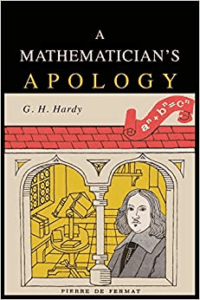In her book, THE ART OF MEMOIR,” Mary Karr lauds several classic memoirs, and as a memoirist myself, I have set about reading them. The first, DISPATCHES, by Michael Herr, was a revelation, and my latest is A MATHEMATICIAN’S APOLOGY by G. H. Hardy.
The modern reader must take into account the era in which the APOLOGY was published (1940), both in the social sense (using “he” and “man” generically, never mentioning women at all) and in the mathematical sense (math has come a long way since 1940). The flavor of a mid-century Englishman is redolent in the language and the self-effacing yet proud attitude. Like mathematics itself however, his observations remain stable while the world around them changes.
Hardy turns to writing this book because, “like any other mathematician who has passed sixty, I have no longer the freshness of mind, the energy, or the patience to carry on effectively with my proper job.”
The book is called an “apology” in the classic sense of the word, “something that is said or written to defend something that other people criticize” or perhaps the alternative sense, “a poor substitute or example.”
In assessing his worth, Hardy writes, “A man who sets out to justify his existence and his activities has to distinguish between two different questions. The first is whether the work…is worth doing; and the second is why he does it, whatever its value may be.”
In answering the first question, he writes that mathematics is “..an unprofitable, a perfectly harmless and innocent occupation.” On the other hand, he is confident that “Archimedes will be remembered when Aeschylus is forgotten because languages die and mathematical ideas do not.” But being a mathematician isn’t easy; “few of us would have chosen to be…Galileo.”
He stumbles over the role mathematics plays in war, concluding that the moral weight lies on the engineers, the physicists, the chemists, and the other scientists who use math for their own ends.
His answer to the second question is that “it is the one and only thing that I can do at all well.” Juxtapose this bit of faux humility with his conviction that, since mathematics is essentially “useless” in the practical sense, it takes a touch of egotism to commit to it at all. “Good work,” he claims, “is not done by ‘humble men’.”
He presupposes that the readers will be able to follow simple examples of mathematical concepts such as rational and irrational numbers, and that we will, of course, be familiar with Pythagoras’s theorem. Pythagoras, Euclid, Newton, and others, are familiar names to me, and somewhere in the dawn of my education, their theorems were explained, but that knowledge faded as other subjects claimed my attention. Newton/gravity/falling apple, yes, but the formula explaining gravity, even the symbols used to represent it, no.
Hardy’s consistent analogy is with chess, which shares math’s respect for unexpectedness, inevitability, and economy. Chess, however, is “trivial,” glowing with aesthetic appeal, but with no lasting contribution to humanity. He states “A mathematical proof should resemble a simple and clear-cut constellation, not a scattered cluster in the Milky Way.”
He demonstrates his clarity of thought over the course of this essay. “A chair or a star is not in the least like what it seems to be; the more we think of it, the fuzzier its outlines become in the haze of sensation that surrounds it; but ‘2’ or ‘317’ has nothing to do with sensation, and its properties stand out the more clearly the more closely we scrutinize it.” Or “317 is a prime not because we think so, or because our minds are shaped in one way rather than another, but because it is so, because mathematical reality is built that way.”
Having run his course professionally, Hardy writes, “That I have created something is undeniable; the question is about its value.” A mathematician keeps constant company with the accomplishments of men who lived hundreds or thousands of years ago, and he is aware that he will not live to see just how valuable his work was.
With economy and clarity, with humor and ambition, Hardy makes the case for his existence. Even well educated people don’t ruminate much on the value of mathematics, and this book is the last word on the subject.
Hardy’s tug-of-war between humility and glory underlies the book, making him an attractive literary interlocutor. In the end, he feels he has “left some kind of memorial behind.”
